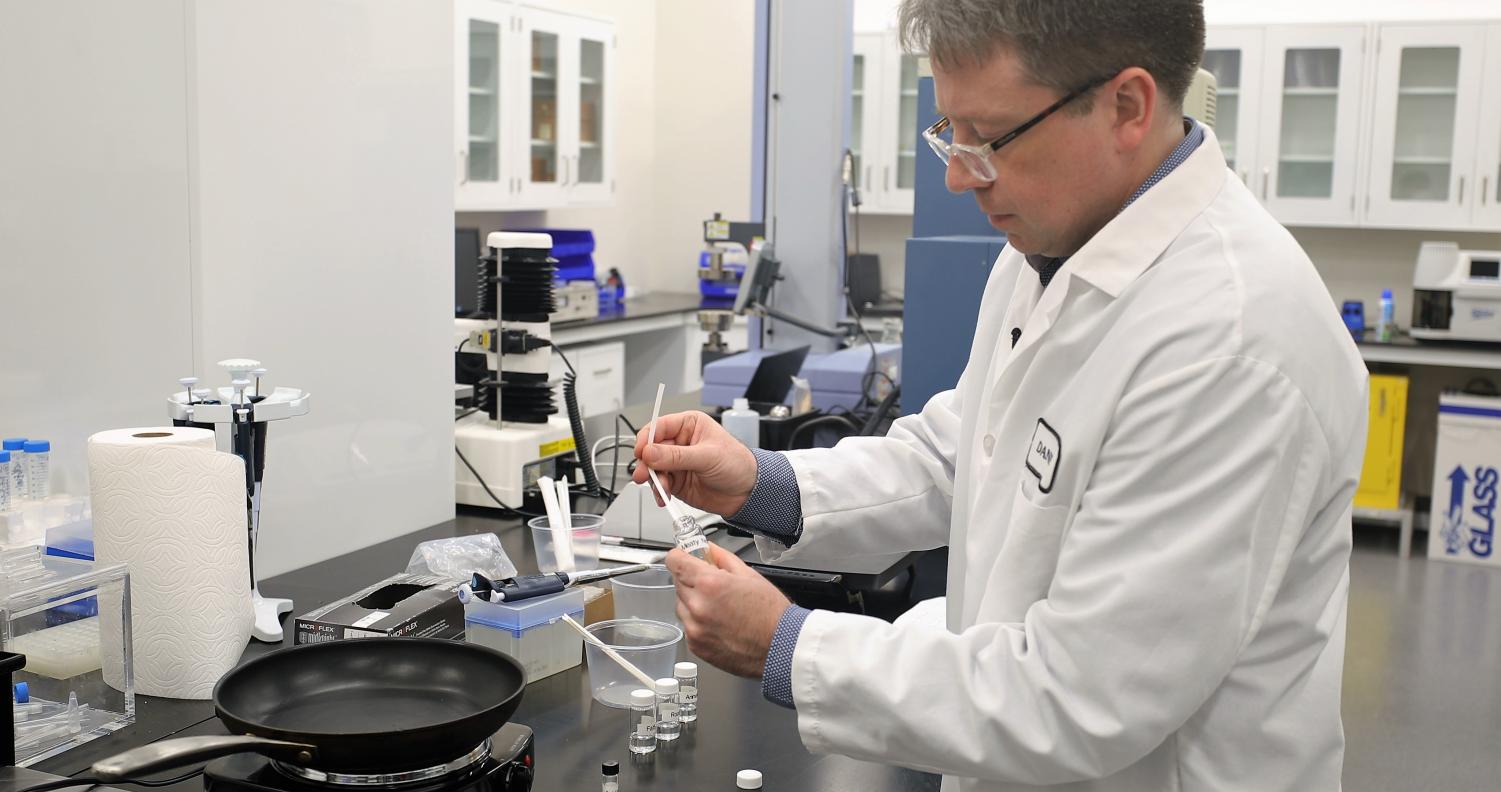
Meatless meat companies: Reinventing the food industry one meal at a time
May 24, 2020
If the entire world were to become vegetarian by 2050, food-related greenhouse gas emissions would drop by around 60%.
Imagine that. A world with only plant-based foods. A world that can eat it’s way to a healthier future.
For many, this idea seems out of reach. Poverty in third-world countries, a global pandemic, political instability – all arguably larger priorities than trying to turn everyone vegetarian. But, for meatless meat companies such as Beyond Meat, Impossible Foods, and Quorn, a world with only plant-based foods doesn’t seem far-fetched.
Products like the Beyond Breakfast Sausage and the Impossible Burger are already being sold at grocery stores and fast-food chains across the United States. Even more impressive, after its debut in 2016, the Beyond Burger has sold more than 25 million units. Beyond Meat’s success has allowed it to begin to spread internationally.
There is no denying their impact, yet thousands of people are still skeptical and hesitant to eat meat products solely made from plants. After all, these companies took a fairly absurd idea – plant-based meat – and made it into a reality.
But, regardless of how successful these companies are on the business side of things, their goal is still to help the planet environmentally. By providing consumers with a vegetarian option that performs like real meat, they hope to slow climate change and preserve natural ecosystems.
They’re reinventing people’s diets with food products that didn’t exist a couple of decades ago, and, beneath capitalism, questions about overprocessing, and allegations regarding food safety, they’re reinventing the world too.
The inner workings of a plant-based company
If a burger isn’t made out of meat, then what is it made out of?
Jessica Appelgren, the vice president of communications at Impossible Foods, has fielded this question countless times. After the release of Impossible Burger 2.0 in 2019 and their nationwide partnership with Burger King (amongst other fast-food chains), the quality of Impossible Burger has been questioned.
According to Vox, Whole Foods CEO John Mackey warned consumers that “they are super, highly processed foods.” Brian Niccol, the CEO of Chipotle, went on further to say, “We have spoken to those folks, and unfortunately, it wouldn’t fit in our ‘food with integrity’ principles, because of processing.”
Despite allegations regarding overprocessing, Impossible Burger sales have continued to skyrocket.
“Growth has come from every sales category in which the company does business – independent restaurants, large restaurant chains such as White Castle, Cheesecake Factory and Burger King, and non-commercial outlets such as theme parks, museums, stadiums, and college campuses. As of April 2020, the Impossible Burger is also available in nearly 1,000 supermarkets across the nation,” Appelgren said. “Long term, we plan for Impossible to be sold everywhere that currently sells animal meat. This means expanding rapidly to new countries, grocery stores, and restaurants.”
Additionally, Appelgren and many other Impossible Foods officials continue to champion the health benefits of plant-based meats.
“Impossible products are always as nutritious, if not more, than the product it is trying to replace. Impossible Burger has zero antibiotics, animal hormones, or slaughterhouse contaminants. It has as much bioavailable iron and protein as a comparable serving of ground beef from cows. And unlike ground beef from cows, Impossible Burger is a good source of dietary fiber,” Appelgren said.
Similarly, Beyond Meat strives to meet or exceed the nutritional content of their meat equivalents. All of their products are GMO-free and said to be made out of healthy, plant-based ingredients such as peas, brown rice, beets, and soy.
“[The Beyond Breakfast Sausage] has been a staple in my own household and I’m glad that families can now enjoy this delicious breakfast option at home while feeling great about nutritional wins like 50% less total fat, 35% less saturated fat and sodium, and no cholesterol compared to a leading brand of pork sausage,” said Ethan Brown, the founder, and CEO of Beyond Meat.
Employees from Impossible Foods, Beyond Meat, and many other meatless meat companies are positive that their work not only contributes to the health of the world but also the customer’s well-being.
"The health and nutrition of our consumers have always been a paramount consideration in choosing our ingredients. We are confident that our careful, evidence-based choices have resulted in a burger that is overall better for the consumer than the cow-derived burger it replaces - and vastly better for the health of the planet," Appelgren said.
The hope to provide consumers with a product that they can enjoy eating is a common goal amongst these meatless meat companies. However, when adding revenue and business into the mix, it's reasonable to believe that competition will arise. Beyond Meat's annual revenue increased 5.4 times, jumping from $16.2 million in 2016 to $87.9 million in 2018. They also sell their products in 50 different international countries and have plans to expand later this year.
However, Appelgren is quick to state that Beyond Meat's success will not impact Impossible Food's goals as a company.
"We wish them the best of luck," Appelgren said. "In our eyes, companies that share our mission of saving the environment and eliminating animals from the food chain, are on our side, and we wish them success."
The world is what you eat
When Greta Thunberg started protesting outside of the Swedish parliament building, she had one goal in mind: to reduce climate change worldwide.
She quickly became a symbol for people of all ages to rise up and push against tradition, the law, and common beliefs. She inspired millions, and, although not directly inspired by Thunberg, companies like Beyond Meat and Impossible Foods are working towards the same goal.
“Animal agriculture occupies nearly half of the world’s land. The industry is responsible for 15% of global greenhouse gas emissions and consumes 25% of the world’s freshwater. We make ‘meat’ using a small fraction of land, water, and energy so that we can eliminate animals from the food system, and consumers can keep eating what they love,” Appelgren said.
In an experiment conducted at the Oxford Martin School’s Future of Food program, researcher Marco Springmann modeled what the world would look like if everyone were to become vegetarian. He predicted that by 2050, food-related greenhouse gas emissions would decline by 60%, in addition to a global mortality reduction of up to 10% and a 68% increase in usable land (which is currently being utilized for livestock).
However, the probability of everyone in the world agreeing to go vegetarian for the environment is low.
Springmann went further to discuss more moderate ways to reduce climate change. He said that merely being more conscious about overconsumption and the consequences of food waste could also decrease food-related emissions. According to Springmann, less than 50% of the calories produced are used effectively.
Similarly, in another study published by Springer Link, it was found that if everyone in the U.K. followed the World Health Organization’s suggested dietary recommendations, their greenhouse gas emissions could drop by 17% (and even more when removing animal products). By simply being more conscious about food waste, people can actively slow down climate change and preserve biodiversity.
For the future
Climate change is not a new idea. It has been discussed by scientists, politicians, and young people like Thunberg for almost a century. Yet, there has been a consistent lack of progress and action taken to prevent entire ecosystems from falling apart.
The reason why companies like Beyond Meat and Impossible Foods (which were founded relatively recently) can take off is because they found an innovative way to approach a normalized idea.
When the consequences of deforestation, mass industrialization, and pollution (to name a few) are gradual, it’s hard to feel just how severe these issues are. By approaching these topics in a new way – by starting a company and using capitalism as leverage for environmentalism – real progress can be seen.
“Personally, I work at Impossible Foods because I share the founding belief of the company that if you give consumers an option that is better for the environment that does not require sacrifice, they will choose that option and massive problems like climate change and biodiversity loss can be addressed. It makes me incredibly happy to know that every burger purchased from us, that a consumer did not buy made from a cow, saves water, land, and greenhouse gases and that we can eat our way to a healthier planet,” Appelgren said.



